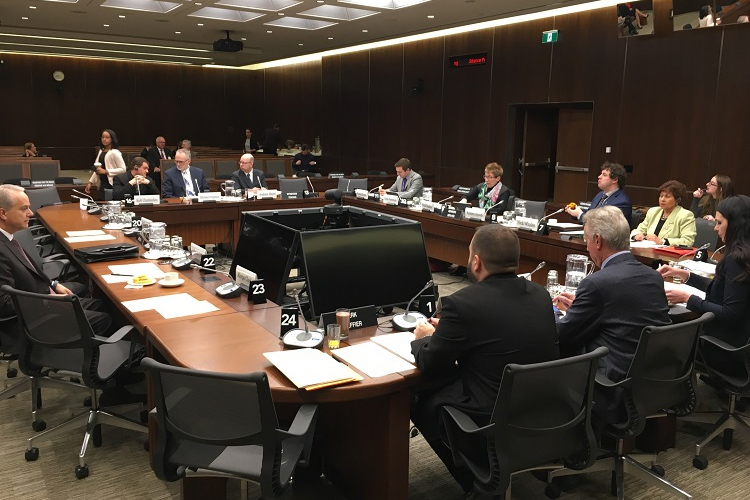ACFO Chair Milt Isaacs Speaks to Ontario Legislative Assembly for Pre-Budget Consultations
Good afternoon, my name is Milt Isaacs and I am a certified management accountant with over 30 years of combined experience in the public and private sectors. Since the Spring of 2005, I have been the President of the Association of Canadian Financial Officers (ACFO), an organization representing financial officers working in the Federal government.
As the President of this Association, I sit on the Board of Vengrowth, the largest Ontario labour sponsored investment fund with assets amounting to close to $900 million. A number of other unions, also supporters of labour-sponsored investment funds, have agreed to my representation of their views on this issue.
You should know that there are close to 700,000 members of Ontario labour organizations that sponsor LSIFs. With me today I have representatives from two of these unions: the Canadian Police Association and of the Professional Institute of the Public Service of Canada.
It can be said that I speak on behalf of groups representing hundreds of thousands of unionized employees throughout the province. It could also be said that we represent hundreds of thousands of investors in Labour-sponsored investment funds. In total, we represent investments of more than $3 billion in the province of Ontario.
In September of 2005, the Ontario government announced that it was cancelling its tax credit for investments in LSIFs. The decision was a surprise to us and, in our opinion, was based on a limited appreciation of the benefits that this program has to offer to the Ontario economy. At that point we engaged the decision makers and presented information that was overlooked on the initial assessment. We appreciated the leadership demonstrated as they took a course correction and decided that, instead of eliminating this program, their approach would instead be to phase it out.
It was our understanding that this change of course would have allowed the Government to review the program and, in the future reconfirm, the tax credit. We felt that the tax-credits should have been confirmed and even increased, not just reinstated for a few years. Today’s economy needs stability, not decisions made on the fly without full consultations.
In December, a decision was made to extend the program for another year. While we appreciate the effort, you must understand that extensions, a year at a time, do not allow us to invest in companies for the long-term as we have to be mindful of our investors’ interest in possible exit strategies. We need a commitment from this government. We need a long-term commitment that will allow us to invest in Ontario’s future economic development.
The approach taken to introduce changes to the LSIF tax-credit program concerns us, because the government has not consulted unions, yet we are the legislated sponsors. Decisions on a program like this should only be made after close consultations with all those involved, appropriate studies and a very good understanding of what the impacts of the decisions will be. We felt that the government would take advantage of this respite in order to study its position. However, we were very surprised, when we met in March 2007 with senior bureaucrats from the Finance Department and the Ministry for Research and Innovation, to see that they were still basing their opinions on biased and out of date, reports and limited data when it came to LSIFs. We felt that the Ontario government was on the right track when then Minister Greg Sorbara told us, in Ottawa, that the government would “look back at the steps it has taken in regards to LSIF and see how, in the future, they can be involved in the venture capital market in Ontario.” This encouraging statement was later confirmed by email.
We acknowledge that it would probably have been easier for the former Minister not to backtrack or promise to change his 2005 decision.
We recognize that all programs need to be reviewed on a regular basis and we are ready to collaborate with the government. This type of cooperation is needed to make a successful program even more successful!
Labour-sponsored funds represent the majority of venture capital investments in Canada and in Ontario providing much needed seed funding to a number of small companies with great ideas that, in the end, showcase Ontario as the hotbed of new technologies fuelling our economy. We have invested in over 200 companies, created at least 27,000 high-value jobs in Ontario, lowered the unemployment rate by almost half a percentage point in the province and supported companies with over 75,000 employees.
The case of Research-in-Motion is one that you all know and can appreciate. This is only one example of LSIF involvement in Ontario’s economy. It is important to note that many companies that are now able to commercialize their ground-breaking technology have been funded, in part by LSIFs.
LSIFs tend to target investments that other venture capital firms would not. Through the tax credit, you are not supporting competition between LSIFs and other companies, but actually helping sectors of the economy that would not otherwise receive support. Also, it would be hard to talk about LSIFs without mentioning the management expertise that we bring to small companies on the verge of making it big.
Without our guidance, some of these companies may not have been able to move forward and be as successful as they have been. This type of expertise cannot be replaced by banks or government officials.
Thanks to the expertise of our fund managers and other funding groups, including those from the US, who have partnered with us to invest in some Ontario firms, we’ve brought hundreds of millions of dollars into our economy – dollars that would not be there if we had not been involved. Due to LSIFs, Ontario has dramatically increased its exports. A sample survey of about half of the companies having received LSIF support show that their exports were over $1.5 billion. Our return on investment is better than that of other mutual funds which is, by itself, a great achievement when you consider that we invest in high-risk start-up companies. It is even a good return on investment for the government since, for example, one year’s worth of provincial tax revenue due to LSIFs was over $350 million – a number that far exceeds the cost of the Ontario tax credits! The 2004 Allen study stated that the government’s costs should be recovered in the same year. Not many government programs can claim the same success.
We understand that the Ontario budget is not unlimited and that when you create a new initiative, you need to look at other programs and see whether cuts need to be made.
Finally, we understand that in 2005, the budget situation was difficult and that the province was trying to balance its books. Minister Sorbara told us in March 2007 that when he looked at the books in 2005 cuts needed to be made but that maybe cutting the tax credit for LSIF was not the right decision. We agreed with him.
We urge you to stop the “rolling of the dice” strategy. By this, we mean that the Government should not suddenly cut funding to a proven provider of venture capital to a vulnerable yet vital sector of the economy in order to create its own fund which may or may not work in the future. We feel that there is room for both.
We believe that Ontario needs to continue to help LSIFs and even increase the tax credit. This has been done by New Brunswick and Saskatchewan. Why not Ontario? Let me quote the Saskatchewan Minister of Industry and Resources: “Saskatchewan residents want to see their investments at work in the province. It’s a great program all around. The funds build companies and jobs and contribute to building a stronger economy.” He also stated that “These funds also provide a great mechanism for people to reduce their personal taxes while promoting economic growth.” This last statement was made four months after the Ontario government decided to begin the phase-out of the program. We need to support programs that work. The LSIF program works. We need to move forward together in a positive way.
The economy is uncertain. Talks of a recession south of the border have economists fearing the worst for our own economy. Job losses in various sectors of the economy have had a devastating impact on some communities.
What Ontario’s economy needs is stability. What our businesses require is long-term certainty. They need to know that they can count on LSIFs to support the development and commercialization of their ideas which could be the next blackberry or a medical device that will help save lives.
Ontario needs to decide whether it will be leading the pack in terms of the”new economy” or whether it wants to follow others. It needs to decide if it wants high-tech firms to stay or move out of the province.
This is why we are requesting this Committee to recommend that the tax-credit for labour sponsored investment funds be confirmed and that the announced phase-out be cancelled. We are also asking the Committee to recommend that the Government sit down with us, the labour movement involved in LSIFs, to look at the program and see how it can be improved in order to meet the needs of the 21st century.
Are labour-sponsored investment funds perfect? No.
Can they be improved? Yes.
Should we work together to improve this program and continue to deliver jobs and revenues to Ontario? Absolutely.






